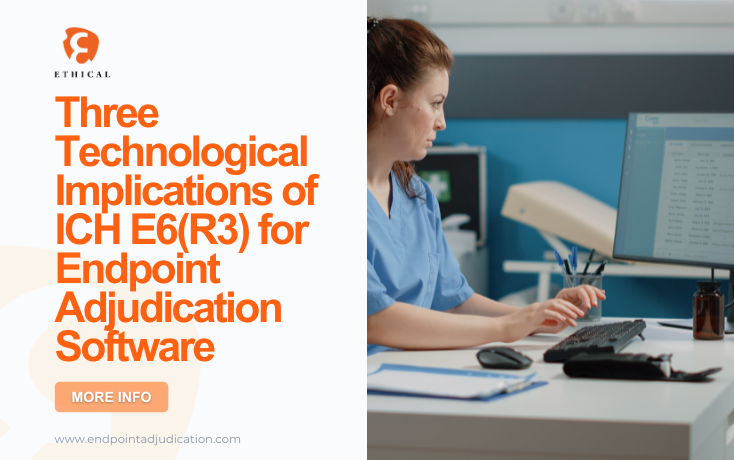Decentralized clinical trials are transforming the way studies are conducted by enabling trial-related activities to take place outside traditional investigator sites. This includes the use of remote patient monitoring, digital health technologies (DHTs), and electronic Patient Reported Outcomes (ePRO). However, this shift also introduces new challenges in data integrity, security, and adjudication reliability. What does this mean for clinical endpoint adjudication software? Let’s explore the key technological implications.
According to Annex 2 of the ICH E6(R3) guidance, “decentralized elements in a clinical trial are those trial-related activities conducted outside the investigator’s location (e.g., a trial visit conducted in the trial participant’s home, local healthcare center, or mobile medical unit, or when data acquisition is performed remotely using digital health technologies (DHTs)).”
As adjudication software adapt to the new regulatory expectations, integrating AI-driven workflows, seamless ePRO/eCOA connections, and secure cloud-based adjudication are no longer optional —they’ve become essential.
1. AI-Driven Automated Adjudication Workflows for Digital Health Data
Why It Matters
Clinical trials with decentralized elements imply that adjudicators must process data from diverse sources—including physician notes, patient-reported outcomes, telemedicine transcripts, and wearable devices. This shift increases complexity and demands automation for efficiency and compliance. The use of AI can optimize the automation and pave the way to efficent clinical adjudication.
Technological Solutions:
✅ Natural Language Processing (NLP): AI-driven text analysis can extract relevant adjudication criteria from unstructured clinical notes, ePRO/eCOA reports, and telemedicine records, reducing manual review time.
✅ Machine Learning for Case Prioritization: AI models can pre-screen adjudication cases, flagging those that require expert review based on pre-defined endpoint criteria.
✅ Automated Data Quality Monitoring: AI-powered tools detect inconsistent, missing, or conflicting data, triggering real-time alerts for adjudicators to prevent data integrity issues.
By integrating AI and NLP, adjudication platforms can significantly reduce delays, improve accuracy, and enhance compliance in decentralized trials.
2. Seamless Integration with ePRO/eCOA for Real-Time Patient Data
Why It Matters
Capturing patient-reported outcomes (PROs) and electronic clinical outcome assessments (eCOAs) is becoming necessary for assessing trial endpoints in decentralized clinical trials. However, without seamless integration, adjudicators may struggle to access and interpret real-time patient data efficiently.
Technological Solutions:
✅ API Integration with ePRO/eCOA Platforms: Adjudication software must support direct data exchange with leading platforms like Medable, Clario, and Medidata, ensuring structured patient-reported data is securely ingested and visualized.
✅ Cloud-Based Access for Adjudicators: Real-time data from mobile health apps and remote monitoring devices should be presented to adjudicators within a single, unified dashboard for streamlined decision-making.
✅ Automated Compliance Checks: Ensuring ICH E6(R3) alignment by integrating features that flag missing or incomplete ePRO data, reducing adjudication errors and ensuring regulatory compliance.
By enhancing connectivity with digital health platforms, adjudication software can ensure timely, accurate, and high-quality endpoint assessments.
3. Secure Cloud-Based Adjudication for Remote Collaboration
Why It Matters
With adjudicators working across multiple locations and trials leveraging decentralized data sources, a secure, cloud-based infrastructure is more than ever essential for maintaining data security, accessibility, and traceability.
Technological Solutions:
✅ Role-Based Access Control (RBAC): Ensures that only authorized personnel can review, modify, or approve adjudication decisions, maintaining compliance with ICH E6(R3), GDPR, and HIPAA.
✅ Embedded Audit Trails & Blockchain Security: A real-time adjudication log captures every decision, ensuring a tamper-proof record for regulatory review and quality assurance.
✅ AI-Driven Risk Detection & Alerts: Machine learning models detect anomalies in adjudication workflows, helping CROs mitigate data discrepancies before they impact regulatory filings.
✅ Cloud-Based Adjudication Panels: Experts can review cases remotely, collaborate on decisions, and submit real-time assessments, reducing delays in endpoint determination.
By implementing secure, cloud-enabled adjudication workflows, sponsors can enhance trial efficiency, regulatory compliance, and data integrity while supporting remote teams.
Conclusion: The Future of Endpoint Adjudication in Decentralized Trials is Being Built Today
With the increasing reliance on wearables, remote monitoring devices, and telemedicine, endpoint adjudication software must evolve to align with ICH E6(R3) guidance. The key to success lies in AI-powered automation, seamless ePRO/eCOA integrations, and cloud-based security measures.
To future-proof clinical endpoint adjudication, sponsors and CROs must embrace:
✅ Automated AI-driven adjudication workflows
✅ Seamless integration with digital health technologies
✅ Regulatory-compliant risk-based monitoring
By adopting advanced, cloud-based adjudication solutions, organizations can enhance efficiency, security, and compliance, ensuring their software is fully aligned with the evolving clinical trial landscape.
Discover the Future of Endpoint Adjudication with eAdjudication®
As decentralized trials continue to evolve, having the right technology in place is crucial for ensuring compliance, efficiency, and data integrity. Ethical’s secure cloud-based eAdjudication® software seamlessly integrates AI-driven workflows and ePRO/eCOA connectivity, aligning with ICH E6(R3) standards. Want to see it in action? Contact us through the form below to learn how eAdjudication® can streamline your adjudication process.




